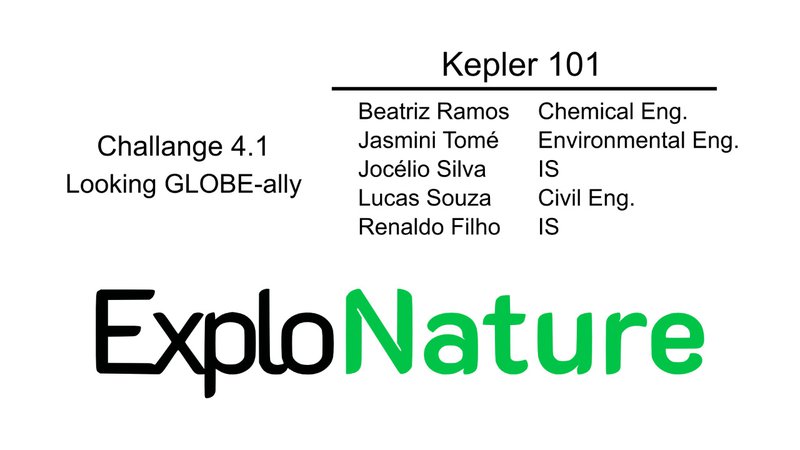Kepler 101 | Looking GLOBE-ally
The Challenge | Looking GLOBE-ally
ExploNature
We are a web space about the planet Earth. Our purpose is to share knowledge with people.

We are team Kepler 101, consisting of Beatriz Ramos, Jasmini Tomé, Jocélio Silva, Lucas Souza and Renaldo Baur. The world needs solutions, but people need knowledge for it. We decided to invest in a different type of education, through a simple language website, that is dynamic and interactive.
NASA has an arsenal data with the potential to increase understanding of how systems govern our planet and positively impact the lives of the population. Still, there is a shortage on the information transfer. That's where our solution comes in. Even with this big data full of information, they are not arranged in such a way accessible to the community, requiring specific knowledge to find certain information. As a solution, we cross link the empirical knowledge with the information of NASA, in an illustrated and intuitive way, segmented by categories, aiming an easy understanding of the information by the general population and a growth in the level of knowledge of our planet.
To reach as many people as possible, we developed a system on a web platform that puts together the "Encyclopedia" of information with the competition incentive in a scoring system that grows as new knowledge is acquired. The competition is given in a ranking between users, as they advance through the categories of content, they answer the quiz and perform the "To do" activities at home. Our system bets on image association, which makes learning easier and faster. We also created the option for users help us, making available to them a space where they can suggest solutions to any of the categories available in the system. The idea can add a model of education and democratize access to scientific knowledge. In addition, it brings NASA closer to people. With knowledge, we will have more people contributing to the idealization of solutions to our planet's problems.
Knowing better our planet help us develop solutions for several areas. With the diffusion of knowledge, technological advances will no longer imply damages to our planet. We know that in a near future, if no prevention measure is adopted, it will be harder to visit the space and knowledge of the universe will be stagnant. The future is not made of data, it is not made of numbers nor rockets. The future is made of people. People who collaborate, who question, who discover, who share. If this tool allows people to collaborate, question, discover and share, we will be building something bigger, a better future.
Our project is available on: https://github.com/renaldobf/ExploNature/
SpaceApps is a NASA incubator innovation program.